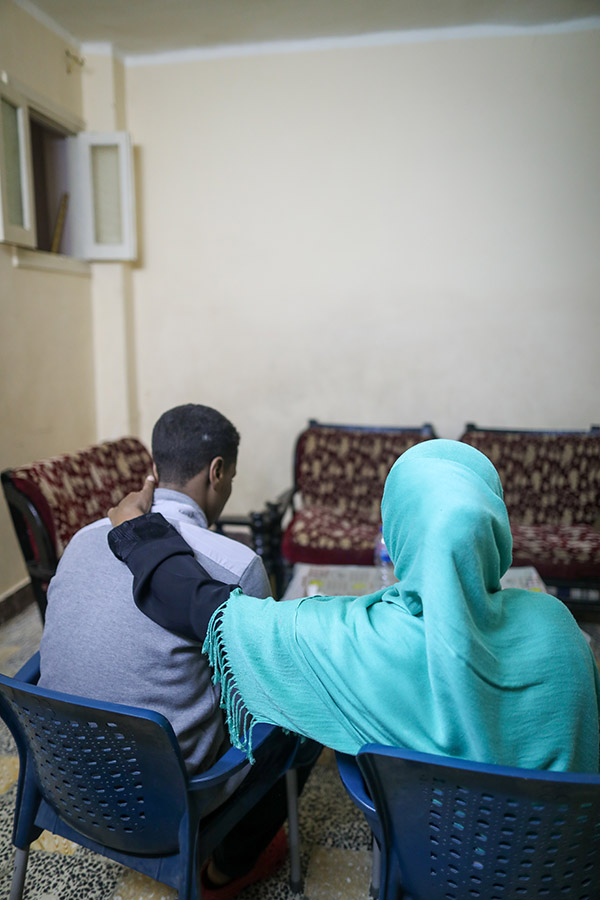Stories of Change

Fatima and her son in their home.
A Mother’s Resilience in the Face of Mounting Odds
It’s dark inside Fatima’s apartment in Cairo. She always keeps the shutters and doors closed, and everything is always locked. It’s for security that her apartment resembles a fortress. But it’s not to keep anyone out.
Sadly, it’s to keep someone in.
Fatima’s 21-year-old son, Anwar, has autism and other health challenges. He loves to look out the window at the world around him. But he doesn’t understand how to manage the window safely, so he tries to climb out of it when he has the chance. Day and night, he wants to get out the window and into the world. For his mother, it’s exhausting. “I haven’t slept comfortably in two years,” Fatima says. Fatima must watch him constantly for his safety.
Fatima is from Eritrea, where she was married to a soldier when their son was born. When Anwar was three months old, his father was killed. The pension his family received after his death wasn’t enough to live on. And when Anwar was 5 years old, he was diagnosed with autism. In Eritrea, both men and women are expected to serve in the military. Eventually the government demanded that Fatima take her husband’s place. She wouldn’t serve in combat, they said, but she needed to learn how to use a gun and have one to defend her family and work as a guard. They suggested that she leave Anwar with relatives while she worked. She couldn’t leave her son that much, so she took Anwar and fled the country.
For two years, the duo lived in a United Nations refugee camp in Sudan. Then they joined a group of people who were heading to Egypt with smugglers. When they made it to Cairo, she lived with the same people she had traveled with. But after a week or so, she no longer felt comfortable. She knew that she and Anwar were becoming less and less welcome because of his autism. She went to the UNHCR office, and they expedited her registration process. Soon, she was able to get cash assistance and a connection to another organization that helped her get her first apartment in Cairo.
Unfortunately, it was just the beginning of the instances where Fatima and Anwar would be unwelcomed because of his autism. Anwar claps frequently and regularly, which has led to complaints from neighbors. In their second apartment, Fatima paid a security deposit when they moved in. Soon, though, Anwar tried to grab the ceiling fan. When their landlord and neighbors heard, they asked Fatima and Anwar to leave despite the deposit. Once when Fatima opened the windows, Anwar fixated on a woman nearby. She complained, labeling him as creepy. Often, when landlords hear about Anwar’s autism, they suddenly don’t have any space available for rent.
Some people in Cairo are understanding about Anwar’s special needs, but many more are not. It has led to some violent and scary situations. Once when they were riding the metro, Anwar got tired. He pulled a girl out a seat and sat down to rest. The girl’s brother beat him. Another time, Anwar was tired and rested his head on the shoulder of an Egyptian man standing next to him. The man slapped him. One day, Anwar had a seizure in the middle of the street. Now that he’s an adult, Fatima couldn’t move or carry him on her own, so it was harder for her to help him.
In talking to Fatima, it’s clear that her desperation is growing. One bright spot in her weekly routine, though, is the support group she attends for refugee mothers of children with special needs. This group takes place at St. Andrew’s Refugee Services, or StARS—CWS’s partner in Cairo. She says the group is useful. It’s better than staying at home and overthinking all of the challenges she’s facing, she says. It’s a safe place to vent with other people who understand what it’s like to have a child with special needs. The information and materials that the StARS team provides in the sessions are helpful, too. Fatima’s only complaint? She wishes the group would go on even longer each time.
Ultimately, Fatima’s story is one of a mother’s resilience in the face of mounting odds. Many of the mothers in the support group have the same stories of being unwelcome or unable to give their children the care that they need. They are everything to their children; caregivers, providers, advocates. We are proud to support StARS as they give these weary parents a bit of respite to feel both seen and heard.
